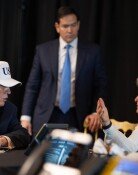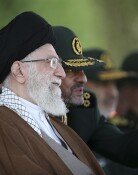US Commerce Secretary asks Korean companies to invest 1 billion dollars
US Commerce Secretary asks Korean companies to invest 1 billion dollars
Posted February. 25, 2025 07:53,
Updated February. 25, 2025 07:53
U.S. Secretary of Commerce Howard Lutnick met with the Korean delegation representing major domestic companies visiting the U.S., explaining that “more than $1 billion in investment (approximately 1.4 trillion won) in the U.S. is required to be eligible for the fast-track process.” In other words, major screening procedures, such as environmental assessment and security screening, may be simplified only if the investment exceeds a certain scale, presenting a type of guideline for investing in the United States.
The Korean trade authorities advise that ‘$1 billion’ is not a minimum investment threshold, interpreting as encouragement to invest more, but the matter is not so simple. U.S. mentioning of billion dollars in the context of Korean companies highlighting achievement of spending 100 million dollars to acquire a U.S. shipyard, could be interpreted as current investment levels not being enough. Washington also said that concrete execution plans, such as plans to commence construction within a year, are needed and capable of delivering tangible results within the Trump administration's term. Such action spells concern for Korea, which has been trying to reduce trade pressure by emphasizing the fact that it has been the No. 1 investor in the U.S. for two consecutive years.
One month into the Trump Administration, the United States has been approaching all international relations from a business perspective, putting U.S. national interests first. President Trump even refers to Korea as a ‘money machine.’ In the face of the United States claiming that “the era of friends (allies) and enemies taking advantage of the United States is over,” stressing “70 years of U.S.-Korea alliance forged in blood” is no longer convincing.
The private delegation highlighted that Korea has invested more than 160 billion dollars in U.S. manufacturing over the past eight years and created more than 800,000 quality jobs. Fields where the two countries can boost synergies, such as shipbuilding, energy, nuclear energy, artificial intelligence (AI), and semiconductors, were also presented. It is a robust and strategic approach, but not enough to induce change in the U.S. position. We must actively look for ‘major projects’ that can bring practical value to both countries and be of interest to the United States.
With a heavy ‘tariff storm’ brewing ahead, leaders of countries around the world are stepping forward and negotiating with the United States. In a leadership vacuum, Korea is merely taking defensive measures to reduce damage to businesses, such as expanding trade finance. We need to take a more proactive active position in the ‘give and take’ game, such as demanding clear incentives commensurate with large-scale investments. Korea needs to be armed with an acute business mindset when dealing with President Trump, a seasoned businessperson.







